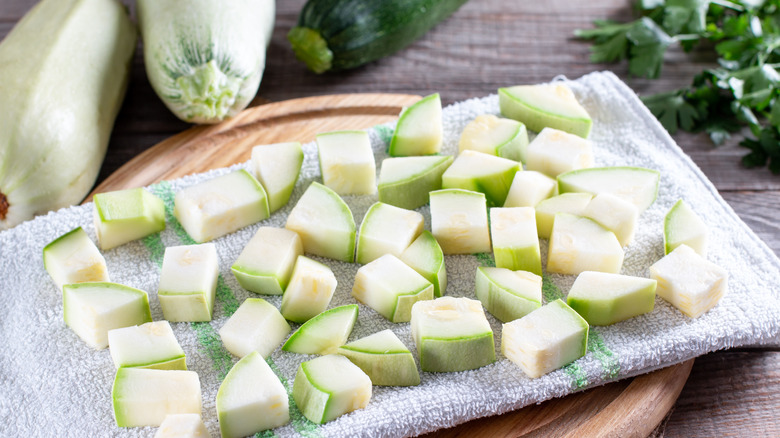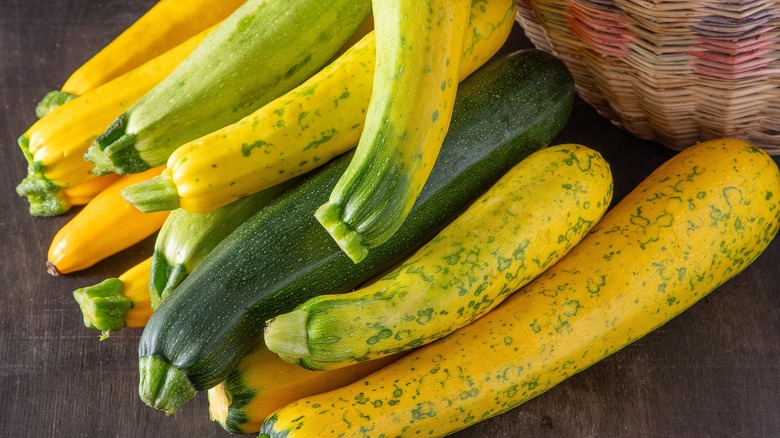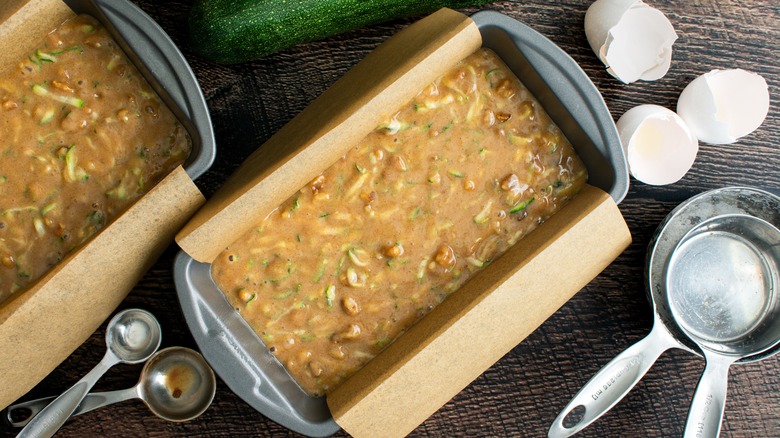The Freezer Storage Trick To Make Zucchini Last All Summer
When it's high summer and your refrigerator's produce drawer is practically overflowing with fresh zucchini from the garden or farmers' market stand, you've made all your best renditions of zucchini bread, and you need to put some away before it turns bad, freezing is the logical solution. Unlike more intricate home preservation processes like canning or even pickling (both doable but more daunting and time-consuming), freezing presents the perfect almost foolproof storage method for fresh veggies.
There are certain ripe summer crops you can truly get away with essentially sticking in the freezer as-is, no real prep needed, and they'll keep for months and months with their nutritional benefits preserved. Others, like the members of the cucurbit family (which contains zukes, its squash cousins, and watermelon), need a little extra care and attention before they're stashed in a bag or container and frozen.
If you've ever simply tossed on-the-brink-of-going-bad zucchini in the freezer only to pull it out later and find a squishy, soggy browned mess, you already know. Luckily, you can avoid food waste and heartache when you take the extra pre-freezer step of blanching or steaming. These methods of just barely cooking the fruit (Yes, it's technically a fruit!) keep the flesh intact, and the heat zaps a key enzyme that controls quality, taste, and texture while promoting food safety by killing off bacteria.
A quick blanch or steam makes all the difference
The trick to experiencing the satisfaction of pulling perfect frozen zukes from your freezer whenever you need them is all about prepping fresh harvests with a quick blanch. This step keeps them from fading and losing their crunch, and a little bit of meticulous care here is the key. When you've got zucchini that are ready to freeze, make sure they're firm and ripe, not showing any signs of decay, rinsed, and free of dirt. The frozen solid contents will be difficult to work with once pulled out of the freezer, so make life easier and chop them into round slices or chunks, or even go ahead and try pre-shredding, depending on how you plan to use them later.
Bring a pot of water to boil on the stovetop, and drop them in. Less is more here: A quick 30- to 60-second blanch is all that it takes to effectively halt the ripening process in its tracks. You'll want to time yourself — either under- or overcooking won't cut it, and can spell disaster in the form of brown, mushy squash. Once the timer's up, immediately drain and dunk the zucchini into an ice bath to halt the cooking process. Something to remember about shredded zucchini is that you won't need to pre-cook it, but you will want to thoroughly squeeze all the excess moisture out of the grated squash before freezing in bags or jars.
How long frozen zucchini lasts and how best to use it
Picture this: It's the dead of winter, fresh summer crops such as summer squash and zucchini are a fading memory, and you're sick of buying store-bought frozen veggies of dubious origins. Then you recall that you future-proofed your kitchen for this very moment by freezing fresh zukes, preserving their flavor so they would be ready to use all year long.
Of course, in almost all cases, freezing fresh fruits or vegetables will somewhat compromise either the taste, texture, or both, but there's a world of difference between properly blanched or steamed frozen zukes and ones that have just been rinsed, sliced, and frozen. Perfectly prepped zucchini that have been blanched, flash frozen on a cookie tray, then transferred into a freezer-safe plastic bag or container should hold up well in the freezer for at least 3 to 4 months, possibly longer (up to 10).
Frozen zucchini makes the perfect addition to veggie-heavy tomato sauces or soups, a rich layered lasagna, or a stir fry. On the sweeter side, you can use your frozen shreds to add fibrous heft and hidden nutrients to zucchini bread and muffins or make your banana bread unbelievably tender with zucchini in the batter. You can even sneak some into your boxed chocolate cake mix. The mild, versatile flavor of this vegetable means that it blends seamlessly into a wide range of sweet and savory recipes — as long as you freeze it the right way.


